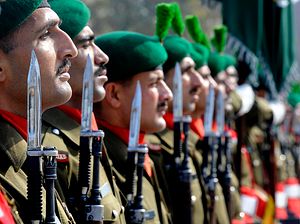On October 7, Dawn, a Pakistani based newspaper, published an article detailing the anxiousness of the inner sanctum of Pakistan’s civilian controlled government. A debate is raging within Pakistan regarding the country’s tacit support of militant groups.
The article titled, “Act against militants or face international isolation, civilians tell military,” detailed plans articulated by the civilian government to military and defense bureaus of the need to act on banned militant groups operating in the country.
The decisive action ordered by Islamabad to combat insurgent groups operating in the country followed a high-level meeting chaired by Prime Minister Nawaz Sharif in which Foreign Secretary Aizaz Chaudhry presented to high ranking members of government that Pakistan’s diplomatic talking points were failing to sway the international community and that Pakistan faced potential international isolation.
As Afghanistan limps on from one its bloodiest fighting seasons that has witnessed almost 4,500 casualties from March to August, many fingers have pointed at Pakistan’s support of Taliban militants for much of the instability and discord ravaging the countryside.
Five of Afghanistan’s provincial capitals are under threat of collapse, and, on Tuesday, Afghan forces struggling to repel Taliban advances around Lashkar Gah were massacred while orchestrating a negotiated tactical retreat; reports indicate that 100 Afghan forces were killed in the ambush.
U.S. forces were rapidly deployed on Wednesday to assist Afghan security forces as they attempted to push back Taliban gains near the entrance of Farah city, the provincial capital of Farah.
Haroon Chakhansuri, a spokesman for President Ashraf Ghani, blamed Pakistan for much of violence in remarks to The New York Times, “We can see there is a lot of truth and evidence — in the examples of fighting in Uruzgan and Kunduz — that terrorist groups and their operations are led by foreigners and generals, and they are receiving military and financial support from outside Afghanistan,” he said. “The way this war is managed, it shows that this is done by experts. This is very clear.”
Over the last several months, the international community has stepped up efforts to pressure Islamabad into ending its support of militant groups. Highlighting its displeasure with Pakistan, the U.S. canceled sales of its F-16 fighter jets to Pakistan, and withheld $300 million dollars in U.S. assistance earmarked for allies combating terrorism around the globe.
Despite Washington’s signals to Islamabad, Pakistan has continued to bloody Kabul through proxy agents — namely the Haqqani Network, Pakistan’s” veritable arm,” and much of the international community sees Pakistan’s hallmark on the terrorist attack on the Indian military camp in Uri, Kashmir that killed 17 Indian soldiers in September.
Pakistan may be feeling the pressure with Tuesday’s arrest of three prominent Taliban leaders including Mullah Nanai who operated as Mullah Akhtar Mansour’s intelligence chief. Local sources have indicated that the arrests were a result of the Taliban’s refusal to enter peace talks with the Afghan government.
However, Afghan officials are skeptical of Pakistan’s sincerity on the crackdown; Dawa Khan Minapal, President Ashraf Ghani’s deputy spokesman stated, “Pakistani government has not informed the Afghan government over its claims of arresting several Taliban members; therefore, Kabul cannot verify the credibility of the report.”
Pakistan has in the past initiated high-level operations to flush out militants in an attempt to sway skeptical minds of its seriousness to combat jihadi groups in the country. In 2014, Pakistan launched a major military operation named Zarb-e-Azb in North Waziristan in an effort to combat militant groups hiding out in Pakistan’s frontier region. However, many analysts have indicated that Pakistan used the operation to protect groups that it deemed important to its strategic efforts, allowing many Taliban factions to flee the area.
The international community should not take Pakistan’s carrot at face value. The Global Competitiveness Report 2016-17 indicates that Pakistan is currently the least competitive economy in South Asia and ranked 122 out of 138 countries overall. The erosion of Pakistan’s industrial base and a reliance on imports has led to Pakistan’s poor competitiveness in the region.
Pakistan’s economic vulnerability has made it dependent on Chinese investments, chiefly the China-Pakistan Economic Corridor as its only shimmering light in a bleak economic forecast.
If the United States and the international community want serious concessions from Pakistan, a credible threat of sanctions must be on the table. As the international community has begun to sour on Pakistan’s support of jihadi groups, the time is ripe to put sanctions on the table; it is time to hit Pakistan where it is most vulnerable.

































